| Listing 1 - 7 of 7 |
Sort by
|
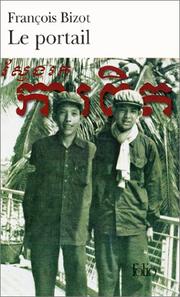
ISBN: 2070417654 9782070417650 Year: 2000 Volume: 3606 Publisher: Paris : Gallimard,
Abstract | Keywords | Export | Availability | Bookmark
 Loading...
Loading...Choose an application
- Reference Manager
- EndNote
- RefWorks (Direct export to RefWorks)
François Bizot, membre de l'Ecole française d'Extrème-Orient, est fait prisonnier au Cambodge par les Khmers rouges, en 1971. Enchaîné, il passe trois mois dans un camp de maquisards. Chaque jour, il est interrogé par l'un des plus grands bourreaux du vingtième siècle, futur responsable de plusieurs dizaines de milliers de morts, aujourd'hui jugé pour crimes contre l'humanité : Douch. Au moment de la chute de Phnom Penh, en 1975, François Bizot est désigné par les Khmers rouges comme l'interprète du Comité de sécurité militaire de la ville chargé des étrangers auprès des autorités françaises. Il est le témoin privilégié d'une des grandes tragédies dont certains intellectuels français ont été les complices. Pour la première fois, François Bizot raconte sa détention. Grâce à une écriture splendide et à un retour tragique sur son passé, l'auteur nous fait pénétrer au cœur du pays khmer, tout en nous dévoilant les terribles contradictions - qui - dans les forêts du Cambodge comme ailleurs - habitent l'homme depuis toujours.
Political prisoners --- Communism --- Political atrocities --- Prisonniers politiques --- Communisme --- Atrocités politiques --- Biography. --- History. --- Biographies --- Histoire --- Cambodia --- Cambodge --- History --- Atrocités politiques --- Narration. --- Prisons --- Réfugiés cambodgiens. --- Violence politique --- Bizot, François, --- Récits personnels français
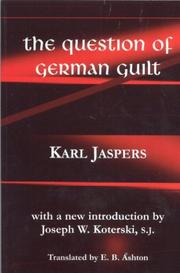
ISBN: 9780823220694 0823220699 0823220680 9780823220687 Year: 2000 Publisher: New York : Fordham University Press,
Abstract | Keywords | Export | Availability | Bookmark
 Loading...
Loading...Choose an application
- Reference Manager
- EndNote
- RefWorks (Direct export to RefWorks)
National socialism. --- World War, 1939-1945 --- Antisemitism --- Nazisme --- 2ème guerre mondiale --- Antisémitisme --- Atrocities. --- History --- Atrocités --- Histoire --- Germany --- Allemagne --- Philosophy. --- Philosophie --- Nationalsozialistisches Verbrechen. --- Kollektivschuld. --- Antisemitism. --- World War (1939-1945). --- 1900-1999. --- Germany. --- 20th century --- Philosophy --- National socialism --- Atrocities --- 2ème guerre mondiale --- Antisémitisme --- Atrocités
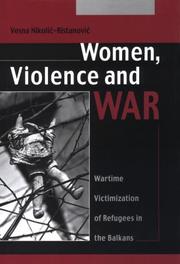
ISBN: 0585369542 9780585369549 9639116599 9789639116597 9639116602 9789639116603 9633865492 9789633865491 Year: 2000 Publisher: Budapest, Hungary New York Central European University Press
Abstract | Keywords | Export | Availability | Bookmark
 Loading...
Loading...Choose an application
- Reference Manager
- EndNote
- RefWorks (Direct export to RefWorks)
Yugoslav War, 1991-1995 --- Women refugees --- Balkan Peninsula --- Regions & Countries - Europe --- History & Archaeology --- Refugee women --- Refugees --- War in former Yugoslavia, 1991-1995 --- Yugoslav Conflict, 1991-1995 --- Yugoslav Wars of Secession, 1991-1995 --- Yugoslav War Crime Trials, Hague, Netherlands, 1994 --- -Women. --- Yugoslav War, 1991 --- -Yugoslav War, 1991 --- -Guerre dans l'Ex-Yougoslavie, 1991-1995 --- Réfugiées --- Guerre dans l'Ex-Yougoslavie, 1991 --- -Atrocities --- Interviews --- Women --- Atrocités --- Femmes --- -Refugee women --- Women.
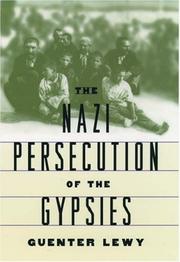
ISBN: 0195125568 Year: 2000 Publisher: Oxford Oxford University Press
Abstract | Keywords | Export | Availability | Bookmark
 Loading...
Loading...Choose an application
- Reference Manager
- EndNote
- RefWorks (Direct export to RefWorks)
Naar de maatstaven van het Nazi-gedachtengoed rond sociale orde, hard werk en raciale zuiverheid, waren zigeuners een affront. Ze werden dan ook als "asociaal" gebrandmerkt, vervolgd, en uiteindelijk naar concentratiekampen gedreven waar vele duizenden van hen werden gedood. Hun vervolging werd tot dusver nog weinig gedocumenteerd, en met deze studie brent professor Lewy daarin verandering. Hij kon gebruik maken van Duits en Oostenrijks archiefmateriaal, waarvan een groot deel nooit eerder werd opengesteld.
Romanies --- World War, 1939-1945 --- Tsiganes --- 2ème guerre mondiale --- Nazi persecution --- Atrocities --- History --- Persécutions nazies --- Atrocités --- Histoire --- 812 Ideologie --- 815 Geschiedenis --- 844.1 Minderheden --- 884.4 West-Europa --- 2ème guerre mondiale --- Persécutions nazies --- Atrocités --- Bohemians (Romanies) --- Gipsies --- Gitanos --- Gypsies --- Kalderash --- Manush --- Roma (People) --- Romani --- Sinti --- Gypsy Holocaust --- Nazi persecution of Romanies --- Romani Holocaust --- Nomads --- Persecution --- Romani Genocide, 1939-1945. --- Baro Porrajmos, 1939-1945 --- Genocide of the Romanies, 1939-1945 --- Nazi persecution of Romanies, 1939-1945 --- Pharrajimos, 1939-1945 --- Porajmos, 1939-1945 --- Porrajmos, 1939-1945 --- Romani Holocaust, 1939-1945 --- Romany Holocaust, 1939-1945 --- Romany Genocide, 1939-1945 --- Samudaripen, 1939-1945 --- Genocide --- Crimes against --- Nazi Holocaust, 1939-1945 (Romani Genocide)
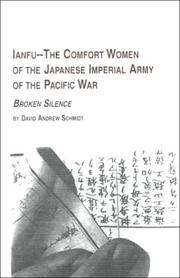
ISBN: 9780773478251 0773478256 Year: 2000 Volume: v. 10. Publisher: Lewiston Mellen
Abstract | Keywords | Export | Availability | Bookmark
 Loading...
Loading...Choose an application
- Reference Manager
- EndNote
- RefWorks (Direct export to RefWorks)
Comfort women --- World War, 1939-1945 --- Femmes de réconfort --- 2ème guerre mondiale --- History. --- Legal status, laws, etc. --- Atrocities. --- Histoire --- Droit --- Atrocités --- J3385.90 --- K9178 --- J4850 --- -Military comfort women --- Japan: History -- Gendai, modern -- Shōwa period -- World War II (1931-1945) -- comfort women, ianfu --- Korea: History -- Japanese annexation period -- World War II (1937-1945) --- Japan: International law -- law of peace and war (including war crimes) --- Korea --- -Women --- -Japan: History -- Gendai, modern -- Shōwa period -- World War II (1931-1945) -- comfort women, ianfu --- -J3385.90 --- -World War, 1939-1945 --- Military comfort women --- -Comfort women --- Femmes de réconfort --- 2ème guerre mondiale --- Atrocités --- Legal status, laws, etc --- History --- Atrocities --- Women
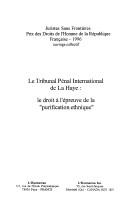
ISBN: 2738495257 Year: 2000 Publisher: Paris L'Harmattan
Abstract | Keywords | Export | Availability | Bookmark
 Loading...
Loading...Choose an application
- Reference Manager
- EndNote
- RefWorks (Direct export to RefWorks)
Criminal law. Criminal procedure --- International law --- Yugoslav War, 1991-1995 --- Crimes against humanity --- Guerre dans l'Ex-Yougoslavie, 1991-1995 --- Crimes contre l'humanité --- Atrocities --- Atrocités --- International Criminal Court --- International Tribunal for the Prosecution of Persons Responsible for Serious Violations of International Humanitarian Law Committed in the Territory of the Former Yugoslavia since 1991. --- Genocide --- -War crime trials --- -Yugoslav War, 1991-1995 --- -Humanitarian law --- 341.645.2 --- Humanitarian conventions --- International humanitarian law --- War (International law) --- War in former Yugoslavia, 1991-1995 --- Yugoslav Conflict, 1991-1995 --- Yugoslav Wars of Secession, 1991-1995 --- Yugoslav War Crime Trials, Hague, Netherlands, 1994 --- -Trials (War crimes) --- Trials (Crimes against humanity) --- Trials (Genocide) --- Trials --- Cleansing, Ethnic --- Ethnic cleansing --- Ethnic purification --- Ethnocide --- Purification, Ethnic --- Crime --- International Tribunal for the Prosecution of Persons Responsible for Serious Violations of International Humanitar --- Crimes contre l'humanité --- Atrocités --- Humanitarian law --- War crime trials --- International Tribunal to Adjudicate War Crimes Committed in the Former Yugoslavia --- International Criminal Tribunal for the Former Yugoslavia --- International Tribunal for the Former Yugoslavia --- Tribunal pénal international pour l'Ex-Yougoslavie --- ICTY --- TPIY --- Tribunal international chargé de poursuivre les personnes présumées responsables de violations graves du droit international humanitaire commises sur le territoire de l'ex-Yougoslavie depuis 1991 --- Međunarodni trubunal za suđenje licima odgovornim za teške povrede međunarodnog humanitarnog prava na teritoriji bivše Jugoslavije od 1991. godine --- Haški tribunal --- United Nations. --- Hague Tribunal --- Internationaler Strafgerichtshof in Den Haag --- Haiya shen pan --- Mezhdunarodnyĭ tribunal po byvsheĭ I︠U︡goslavii --- MTBI︠U︡ --- Mechanism for International Criminal Tribunals
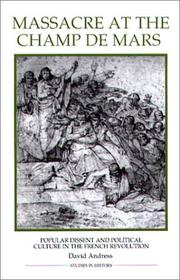
ISBN: 9781843838425 1843838427 9786610545599 1846150078 1280545593 0585443610 0861932471 Year: 2000 Publisher: Suffolk : Boydell & Brewer,
Abstract | Keywords | Export | Availability | Bookmark
 Loading...
Loading...Choose an application
- Reference Manager
- EndNote
- RefWorks (Direct export to RefWorks)
On 17 July 1791 the revolutionary National Guard of Paris opened fire on a crowd of protesters: citizens believing themselves patriots trying to save France from the reinstatement of a traitor king. To the National Guard and their political superiors the protesters were the dregs of the people, brigands paid by counter-revolutionary aristocrats. Politicians and journalists declared the National Guard the patriots, and their action a heroic defence of the fledgling Constitution. Under the Jacobin Republic of 1793, however, this 'massacre' was regarded as a high crime, a moment of truth in which a corrupt elite exposed its treasonable designs. This detailed study of the events of July 1791 and their antecedents seeks to understand how Parisians of different classes understood 'patriotism', and how it was that their different answers drove them to confront each other on the Champ de Mars. DAVID ANDRESS is senior lecturer in Modern European History, University of Portsmouth.
France --- History --- Atrocities --- Histoire --- Atrocités --- Louis --- Bailly, Jean Sylvain, --- Flight to Varennes, 1791. --- Death and burial. --- Atrocities. --- Lodewijk --- Bro-C'hall --- Fa-kuo --- Fa-lan-hsi --- Faguo --- Falanxi --- Falanxi Gongheguo --- Faransā --- Farānsah --- França --- Francia (Republic) --- Francija --- Francja --- Francland --- Francuska --- Franis --- Franḳraykh --- Frankreich --- Frankrig --- Frankrijk --- Frankrike --- Frankryk --- Fransa --- Fransa Respublikası --- Franse --- Franse Republiek --- Frant︠s︡ --- Frant︠s︡ Uls --- Frant︠s︡ii︠a︡ --- Frantsuzskai︠a︡ Rėspublika --- Frantsyi︠a︡ --- Franza --- French Republic --- Frencisc Cynewīse --- Frenska republika --- Furansu --- Furansu Kyōwakoku --- Gallia --- Gallia (Republic) --- Gallikē Dēmokratia --- Hyãsia --- Parancis --- Peurancih --- Phransiya --- Pransiya --- Pransya --- Prantsusmaa --- Pʻŭrangsŭ --- Ranska --- República Francesa --- Republica Franzesa --- Republika Francuska --- Republiḳah ha-Tsarfatit --- Republikang Pranses --- République française --- Tsarfat --- Tsorfat --- Γαλλική Δημοκρατία --- Γαλλία --- Франц --- Франц Улс --- Французская Рэспубліка --- Францыя --- Франция --- Френска република --- פראנקרייך --- צרפת --- רפובליקה הצרפתית --- فرانسه --- فرنسا --- フランス --- フランス共和国 --- 法国 --- 法蘭西 --- 法蘭西共和國 --- 프랑스 --- France (Provisional government, 1944-1946) --- HISTORY / Europe / France. --- Champ de Mars. --- Corruption. --- Counter-Revolutionary Aristocrats. --- Jacobin Republic. --- Massacre. --- National Guard. --- Parisians. --- Patriotism. --- Political Unanimity. --- Treason.
| Listing 1 - 7 of 7 |
Sort by
|

 Search
Search Feedback
Feedback About UniCat
About UniCat  Help
Help News
News